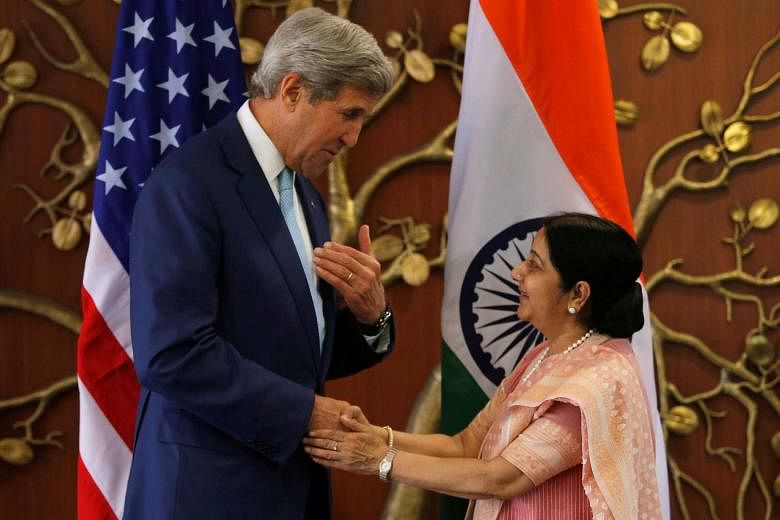India and the United States have signed a key military pact to facilitate the use of each other's military bases for repair and refuelling, signalling a deepening engagement amid mutual concerns over China's growing dominance.
The two nations, in separate talks, also agreed to increase counter-terror cooperation, including increasing screening for terrorists and initiating a trilateral dialogue with Afghanistan where the government is struggling to battle Taleban and Islamic State in Iraq and Syria extremists.
"We are witnessing a moment that defines for certain a very different and renewed relationship between the US and India," US Secretary of State John Kerry said, following the second India-US Strategic and Commercial Dialogue yesterday. "(Over the) last two years, we have really moved amazingly in this relationship," Mr Kerry said, pointing to the logistics agreement as evidence of new vigour in ties.
The agreement, which was signed in Washington, DC, on Monday, has been in the making for over a decade. It will not see troops being permanently stationed in each other's bases but will let their military bases be used for joint operations, exercises, and humanitarian and rescue missions.
Ties between India and the US have been on the upswing, particularly with Prime Minister Narendra Modi showing little hesitation in pursuing a closer relationship with the US. The logistics agreement had been delayed over domestic political opposition amid fears India would be drawn into a military alliance with the US. But the growth of China, experts said, had led India to recalibrate its strategy and move towards deepening ties with the US.
India has a festering border issue with China that flares up intermittently while the US has been alarmed by China's assertiveness in territorial disputes with Vietnam, the Philippines and Japan.
Dr Rajeshwari Pillai Rajagopalan, senior fellow at the Observer Research Foundation, said: "The strategic consequence of China's rise has been an important factor in pushing India to kind of do this. The growing Chinese military might and belligerent posturing by China has raised a lot of concerns.
"Nothing huge is going to happen but it (the agreement) formalises practices which had been done in an ad-hoc manner to access each other's facilities."
China yesterday characterised the pact as "normal cooperation". "(We) hope that this cooperation between India and the US would work to promote stability and development of the region," Chinese Foreign Ministry spokesman Hua Chunying said.
Experts also said the dialogue on various issues revealed a growing convergence between the two countries in spite of irritants such as US dissatisfaction with India's intellectual property rights regime and India's grouse against high visa fees for its US-bound professionals.
Mr Kerry said the US was pursuing a deal to provide nuclear energy assistance to India as the nations seek to meet a goal of boosting annual trade fivefold to around US$500 billion (S$682 billion).
The two countries also urged Pakistan to bring to justice the perpetrators of the 2008 Mumbai terror attacks and this year's attack on an Indian air force base.
"The state of relations between India and the US is comfortable. And the defence agreement is consolidating a strategic partnership," said former Indian foreign secretary Lalit Mansingh.

